Tokyo hosts the World Athletics Championships in September 2025. A look at some of the most popular and most watched home-team athletes from the land of the rising sun.
Looking for a Podium Finish
From September 13 to 21, 2025, Tokyo will host this year’s World Athletics Championships. This is the first time for the tournament to take place in the city since 1991, and Team Japan is going all out, fielding a squad of 80 athletes.
Below we take a look at a handful of standout Japanese competitors from the team. Japanese fans are certain to be cheering them on as they pursue new national records—or even world championships—in this year’s games.
Kitaguchi Haruka (Women’s Javelin)
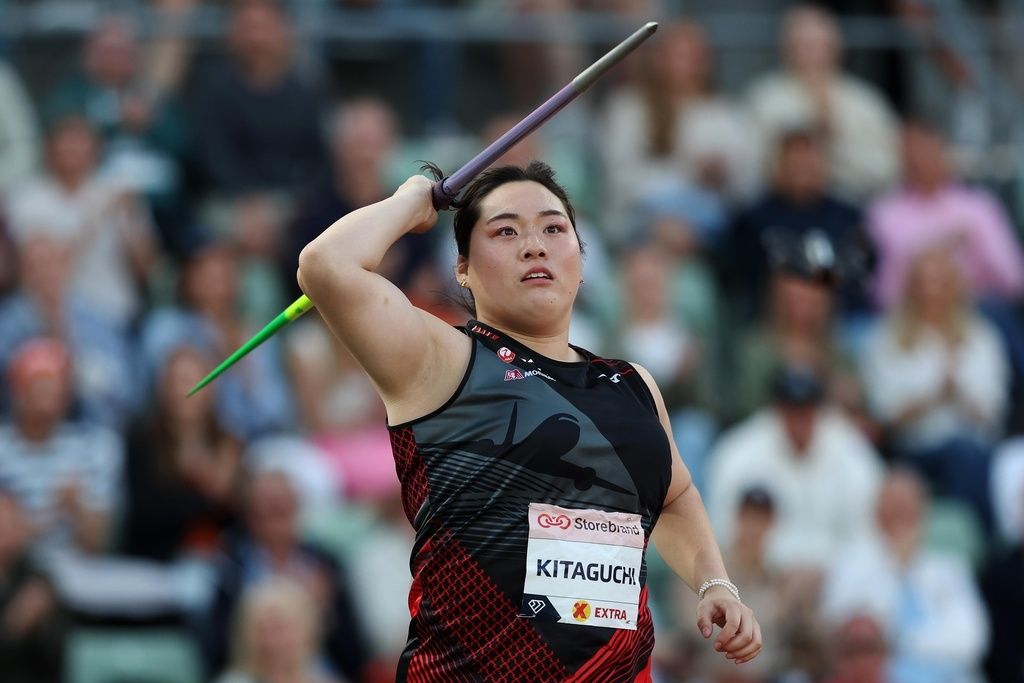
Born March 16, 1998. From Hokkaidō. Major achievements: Gold medal, Paris Olympics, 2024; Gold medal, World Athletics Championships, 2023; Bronze medal, World Athletics Championships, 2022. (© Getty/Kyōdō)
An Olympic Champion’s Mixed Emotions
Javelin thrower Kitaguchi Haruka must have felt torn when she was forced to sit out the Japan National Championships in July 2025. Despite being the most closely watched figure in Japanese track and field, she had no choice but to withdraw due to pain in her right elbow.
Frustrated at not being able to compete, Kitaguchi followed the meet on television and online, an experience she admits left her “moved to tears many times.” Yet it helped reset her determination. “It was a real source of inspiration,” she said. “I want to keep pushing forward without losing heart.”
Kitaguchi made history at the 2023 World Athletics Championships in Budapest, becoming world champion for the first time. A year later in Paris, she claimed Japan’s first-ever Olympic gold medal in a women’s track and field event. The unforgettable image of her ringing the victory bell at the Olympic Stadium still resonates with fans. But just as she was preparing for this year’s World Championships, held in Japan for the first time in 18 years, an untimely setback struck. At an international meet in June, she felt something was wrong. She later wrote on her X account:
“After competing in the Czech Republic, I noticed discomfort in my right elbow. A medical checkup right after I got back to Japan revealed inflammation, so I’ve decided to withdraw from the Japan Championships.”
The diagnosis was medial epicondylitis of the right elbow, a condition also seen in golfers and tennis players, caused by overuse of the elbow and wrist that inflames the bony protrusion on the inside of the joint.
Fortunately, as the defending world champion she had already secured her place on the national team, so she chose to err on the side of caution by skipping the Japan Championships. Her comeback was set for August 20 at the Diamond League meet in Lausanne, Switzerland. But there she finished a disappointing tenth, proof that her road to a full recovery came with challenges.
Chasing the 70-Meter Mark
Expectations for Kitaguchi go beyond a world title defense: Fans and coaches alike hope to see her surpass the elusive 70-meter barrier. Her personal best, 67.38 meters, was set at the Diamond League meet in Brussels in September 2023, a mark that also stands as the current Japanese national record. The women’s world record, 72.28 meters, was established in 2008 by the Czech hurler Barbora Špotáková. Only five women have ever thrown beyond 70 meters since the 1999 introduction of a new specification for the javelin, a feat requiring near-perfect conditions and execution.
At the Japanese team’s press conference on July 7, Kitaguchi took part in a Tanabata ritual at the organizers’ request, writing on her tanzaku paper: “May the javelin fly straight.” The words could not have been simpler, almost childlike. Yet in the javelin throw, that is the hardest truth of all. A single flaw in form and the spear will not fly as intended. Through her injury, Kitaguchi is striving to return to fundamentals. It is there, in rediscovering the basics, that she hopes to find the path toward the distance she seeks.
Kawano Masatora (Men’s 35-Kilometer Race Walk)
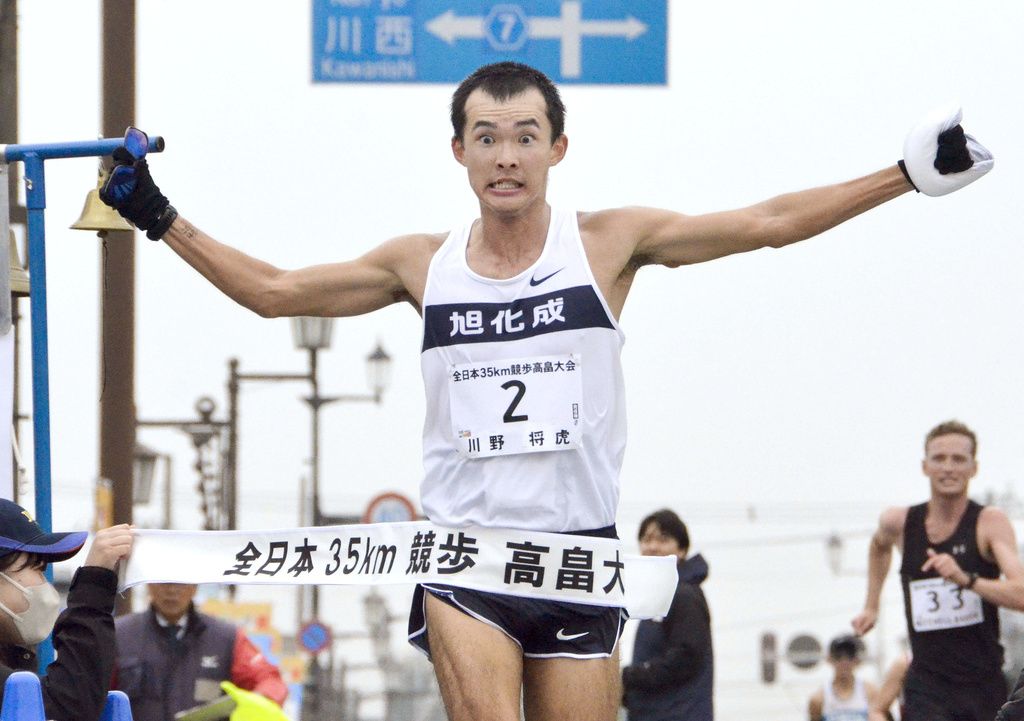
Born October 23, 1998. From Miyazaki Prefecture. Major achievements: World record, 35 km, 2024 Japan National Championships; Bronze medal, World Athletics Championships, 2023; Silver medal, World Athletics Championships, 2022; 6th place, Tokyo Olympics, 2021. (© Kyōdō)
World-Class Strength
In Japanese race walking, where top athletes crowd the field, Kawano Masatora secured his ticket with a world record performance. Expectations are high that he could capture his first-ever gold medal.
Kawano carries a bitter memory. On August 6, 2021, during the Tokyo Olympics, he took part in the men’s 50-kilometer walk held in Sapporo, chosen for its cooler climate. But an unexpected heat wave took temperatures above 30º Celsius before 9:00 in the morning, and around the 41-kilometer mark, he collapsed on the road, vomiting from what appeared to be heatstroke. Even so, he gritted his teeth and pressed on, finishing sixth, the highest placing among Japanese competitors.
The 50-kilometer was discontinued after the Tokyo Games, replaced in 2022 by the new 35-kilometer event. The Tokyo events in September 2025 will mark only the third time this distance has been contested at the World Athletics Championships, and Kawano is set to challenge it for the third straight time.
Last October, at the Japan Championships in Takahata, Yamagata Prefecture, he clocked 2:21:47, setting the inaugural world record in the event (defined by the World Athletics organization as the first sub-2:22 time in the new race format). The time also cleared the Japanese federation’s qualifying standard for the Worlds (2:26:00). With that, he instantly secured his place on the national team, proving his credentials as one of the world’s elite race walkers.
After setting the world record, Kawano reflected: “I earned the right to compete at the World Championships, but I don’t see that as the goal. It’s simply the starting line. I’ve trained to handle a high pace, and I was able to show the results of that work today. I’m glad that what I’ve been building toward has finally borne fruit.”
The bar, however, continues to rise. In March this year, Canada’s Evan Dunfee shaved seven seconds off Kawano’s world record. Just two months later, Italy’s Massimo Stano, the Tokyo Olympic champion in the 20-kilometer race walk, lowered it even further with a 2:20:43 performance.
Heat Management Will Be Key
At the World Championships, Kawano has already proven his consistency, winning silver in Oregon in 2022 and bronze in Budapest in 2023. The 35-kilometer walk was not held at last year’s Paris Olympics; instead, he teamed with Okada Kumiko of Fujitsu in the mixed relay, finishing eighth. As he heads into the Tokyo Worlds, his remark about “finally standing on the starting line” reflects his hard-earned awareness of just how tough the global stage has become.
The men’s and women’s 35-kilometer race walks will start together at 8:00 am on September 13, the opening day of the meet. Although the date is a month later than the Tokyo Olympics, sweltering conditions are still expected. Japan’s race walkers are leaving nothing to chance in their preparations for the heat. Kawano, mindful of the lesson from four years ago, now sets his sights on the very top of the world.
Tanaka Nozomi (Women’s 1,500 Meters, 5,000 Meters)
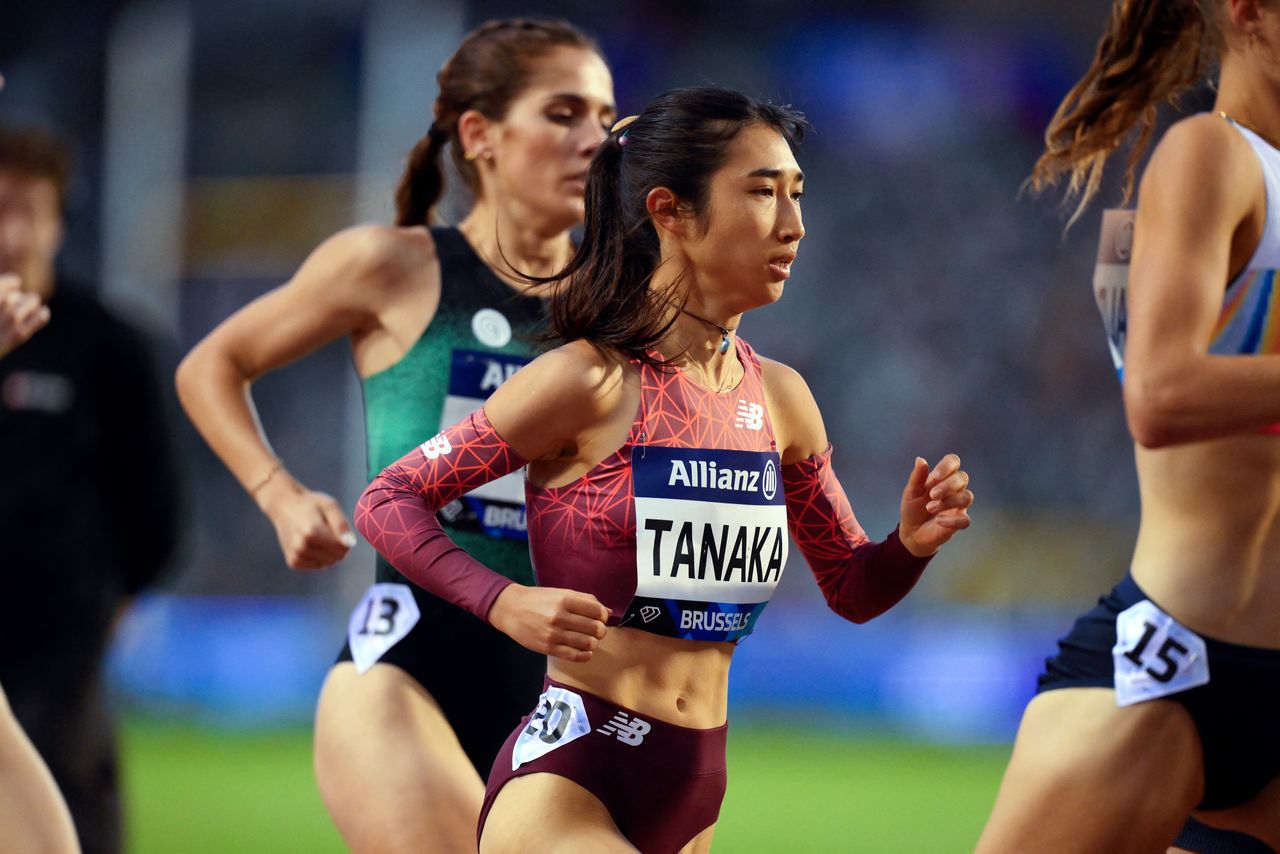
Born September 4, 1999. From Hyōgo Prefecture. Major achievements: 8th place, 5,000 meters, World Athletics Championships, 2023; 8th place, 1,500 meters, Tokyo Olympics, 2021. (© AFP/Jiji)
Turning Professional Two Years Ago
Perhaps it was the sense that she could no longer stay where she was. In April 2023, Tanaka Nozomi, the ace of Japanese middle- and long-distance running, left her corporate team at Toyota Industries and signed with the Boston-based shoe manufacturer New Balance. It was a decisive move: If she wanted to compete with the very best in the world, she needed to train in an international environment as a professional athlete.
Tanaka had already been supported by New Balance since her days at Dōshisha University in 2019, receiving shoes and other backing. Training in Boston with the company’s overseas team gave her the push to change her circumstances.
“As I’ve gained more experience racing on the world stage, I’ve felt a stronger desire to grow beyond what I’ve achieved so far. I want to train with different teams, in different places, and build a rhythm that aligns with the world’s top athletes through the competitive season.”
Tanaka stunned the nation four years ago, when she finished eighth in the women’s 1,500 meters at the Tokyo Olympics. It was Japan’s first appearance in a women’s middle-distance final in 93 years, since Hitomi Kinue took silver in the 800 meters at the 1928 Amsterdam Games. With her extraordinary speed, she has remained untouchable among Japanese competitors.
Her former team, Toyota Industries, is one of the strongest in Japan’s corporate athletics system, and for an athlete competing domestically, it offered an ideal environment. But Tanaka wanted more. “Lately, I’ve felt myself losing that hunger because I was letting myself go soft,” she admitted when announcing her departure.
Traveling the World with Her Father/Coach
Tanaka has been guided since her university days by her father, Katsutoshi, himself a former corporate team runner, who now serves as her full-time coach. The two have toured the globe together, training in places like Kenya and the United States alongside international athletes, all in pursuit of higher-level racing.
The process has been one of constant trial and error. At the 2023 World Championships in Budapest, her first major meet since turning professional, she placed eighth in the final 5,000 meters race but fell short in the 1,500, eliminated in the semifinals. At last year’s Paris Olympics she missed the finals in both events, heightening her determination to make a mark at the World Championships in Tokyo.
“The crowd support for the French runners in Paris was incredible. It felt like a rumbling beneath your feet, pushing you forward,” she recalled at a press conference after securing her spot on Japan’s national team. “That kind of energy gives you momentum. So to be able to race in front of a packed National Stadium here in Tokyo, I think that can be a real advantage.” With the power of home support at her back, Tanaka hopes to turn this championship into a stage for her breakthrough.
Kiryū Yoshihide (Men’s 100 Meters, 4×100-Meter Relay)
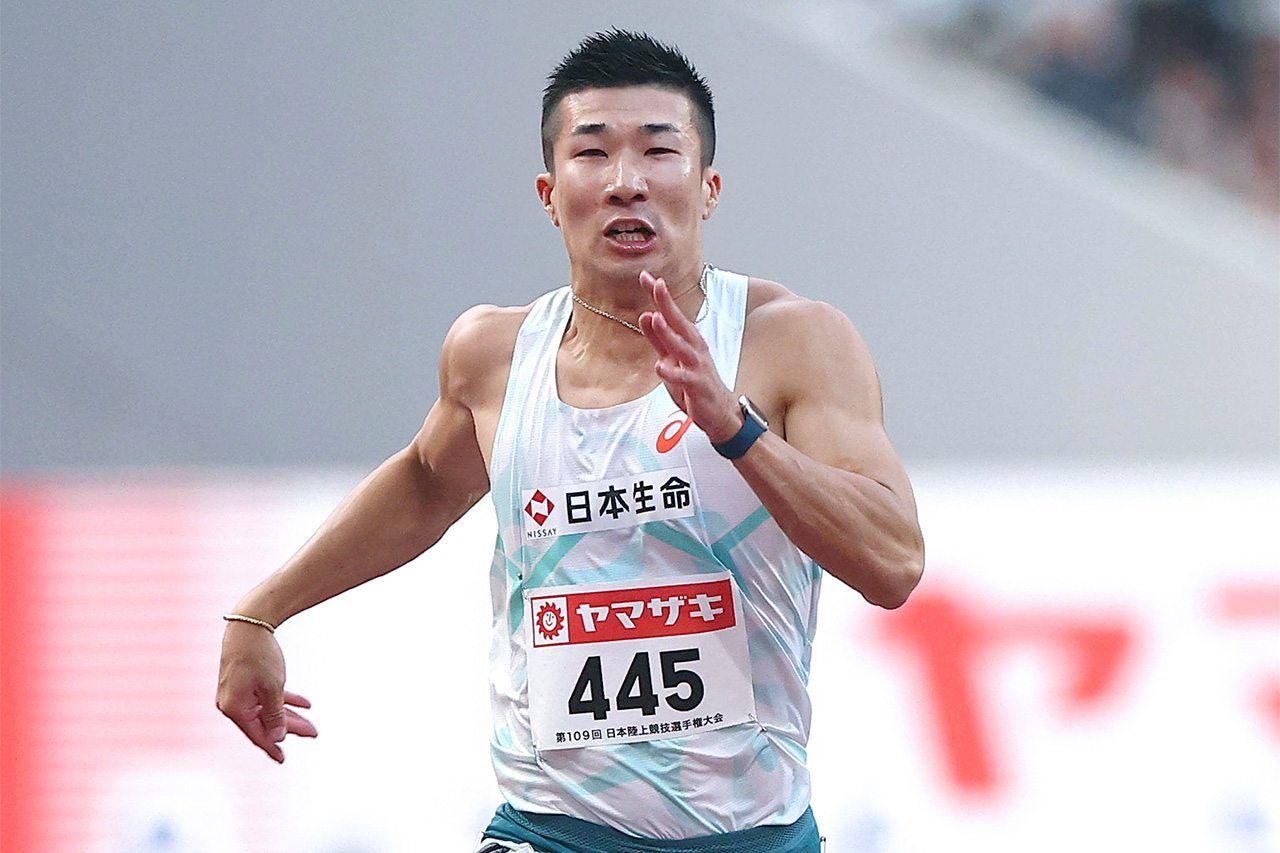
Born December 15, 1995. From Shiga Prefecture. Major achievements: Silver medal, 4×100-meter relay, World Championships, 2019; Bronze medal, 4×100-meter relay, World Championships, 2017; Silver medal, 4×100-meter relay, Rio Olympics, 2016. (© Jiji)
Rediscovering the Feel of a Comeback
It felt like emerging from a long, dark tunnel. The clock flashed 9.99 seconds. On August 3, 2025, at the Fuji Hokuroku World Trial in Yamanashi Prefecture, Kiryū broke the 10-second barrier for the first time in eight years. The man who in 2017 became the first Japanese sprinter ever to run a sub-10, with a 9.98 had at last shown he was back.
Kiryū represented Japan in the 100 meters at the Rio 2016 Olympics, where he also helped secure a silver medal in the 4×100-meter relay. But he failed to qualify for the individual event at both the Tokyo 2021 and Paris 2024 Games, and though selected as a relay member, he did not reach the podium. In recent years, his presence on the Japanese sprinting scene had seemed to fade.
Meanwhile, the men’s 100 meters in Japan has become fiercely competitive. A wave of new talent has emerged, most recently in July 2025, when 16-year-old Shimizu Sorato, a second-year student at Seiryō High School in Ishikawa, broke Kiryū’s long-standing national high school record. His 10.00 seconds also set a new world best for under-18 athletes, as recognized by World Athletics.
Kiryū, however, was grappling with personal struggles of his own. After the Tokyo Olympics he revealed that he had been battling ulcerative colitis, a government-designated intractable disease, since his sophomore year of university. The announcement was followed by a three-month hiatus from competition. Doctors told him that stress was the primary trigger. The relentless pressure had not only weighed on his mind but also taken a toll on his body.
A Boost from Super Spikes
After years of hardship, Kiryū reclaimed the men’s 100-meter title at the Japan Championships in July, his first national crown in five years. Since last autumn he has been racing in the thick-soled “super spikes” now standard among the world’s elite, and his growing adaptation to them has played a key role in his resurgence. Crossing the finish line, he wept openly. “I’ve been running track since junior high, more than ten years now,” he confessed. “But this was the first time I’ve ever shed tears of joy.”
With back-to-back breakthroughs, first the national title and then a sub-10 at Fuji Hokuroku, Kiryū looked back on his career with fresh perspective:
“Each year has been intense. There were stretches where I had to train in a certain way, or rethink what needed to change. That went on for eight years. If I were to retire someday, I know those years without fast times would still be an essential part of me, a real asset.”
Kiryū turns 30 this December. Having endured setbacks and rediscovered his form, the veteran sprinter now stands at a new peak. Japan’s eyes will be on how he performs at the World Championships in Tokyo.
Other Potential Stars
Japan is sending an 80-strong team to this year’s World Athletics Championships. Below we introduce a few more members of this squad who are in the public eye as they head into the competition.
Miura Ryūji (Men’s 3,000-Meter Steeplechase)
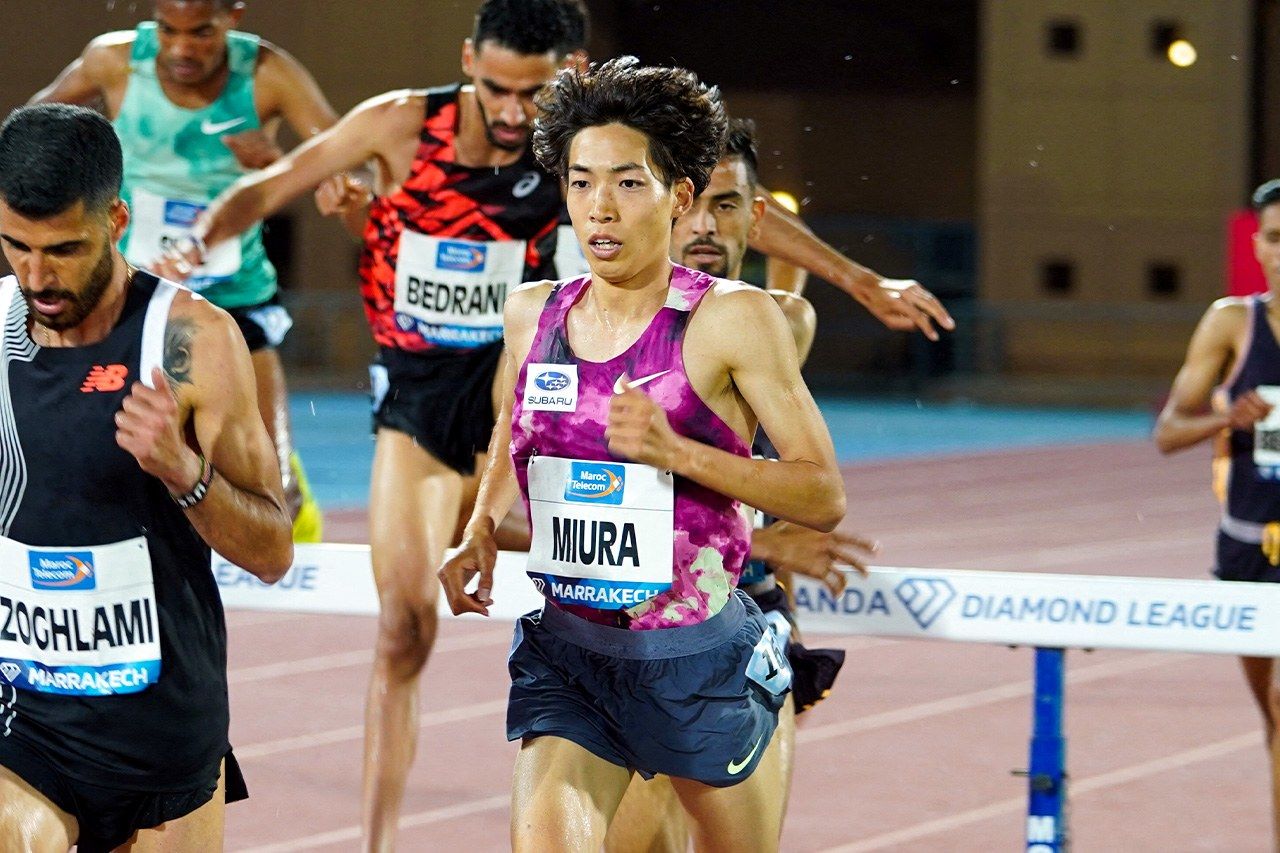
Born February 11, 2002. From Shimane Prefecture. Major achievements: National record (08:03.43), Diamond League Monaco meet, 2025 (third best for 2025 season); 8th place, Paris Olympics, 2024; 6th place, World Athletics Championships, 2023; 7th place, Tokyo Olympics, 2021. (© Reuters)
Yamanishi Toshikazu (Men’s 20-Kilometer Race Walk)
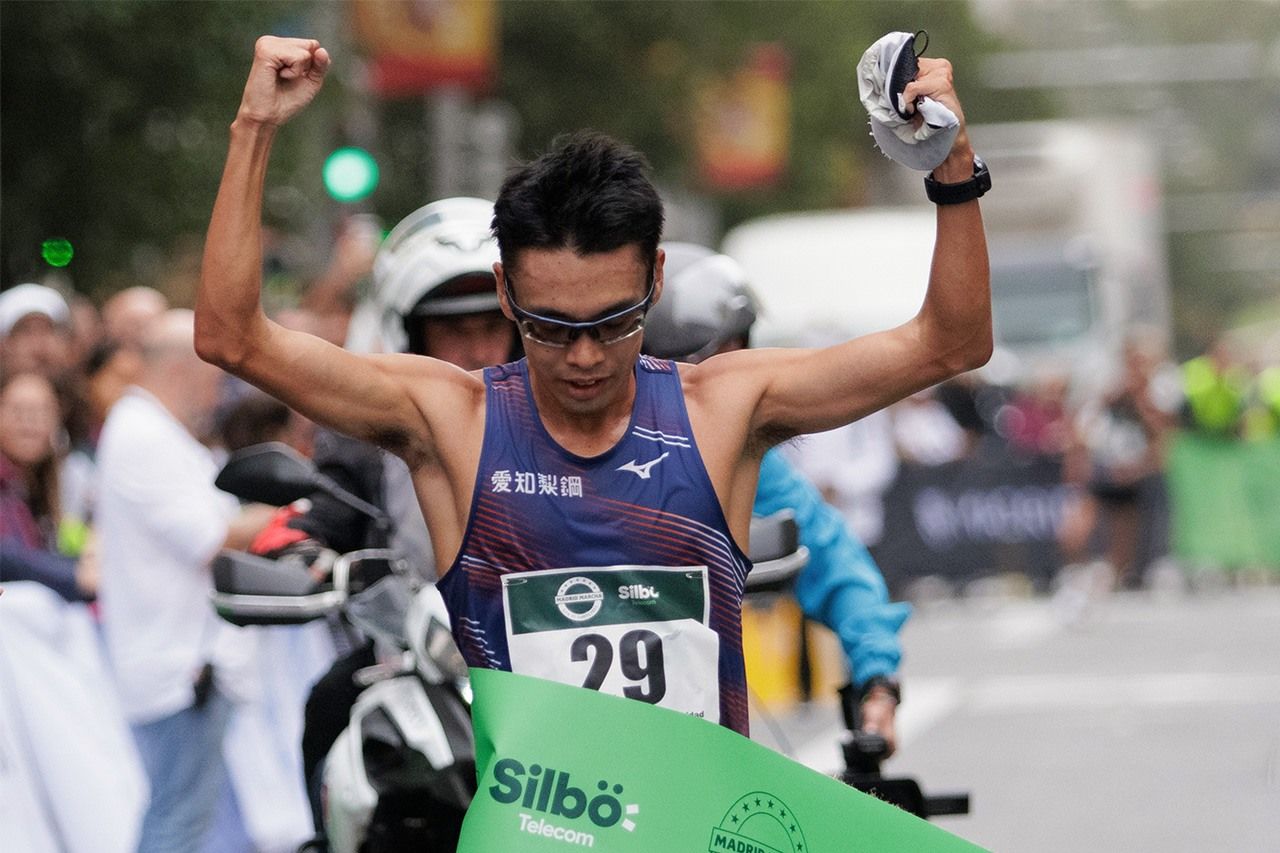
Born February 15, 1996. From Kyoto Prefecture. Major achievements: World record (1:16:10), Japan National Championships, 2025; gold medal, World Athletics Championships, 2022; bronze medal, Tokyo Olympics, 2021; gold medal, World Athletics Championships, 2019. (© Guillermo Martinez/Reuters)
Muratake Rachid (Men’s 110-Meter Hurdles)
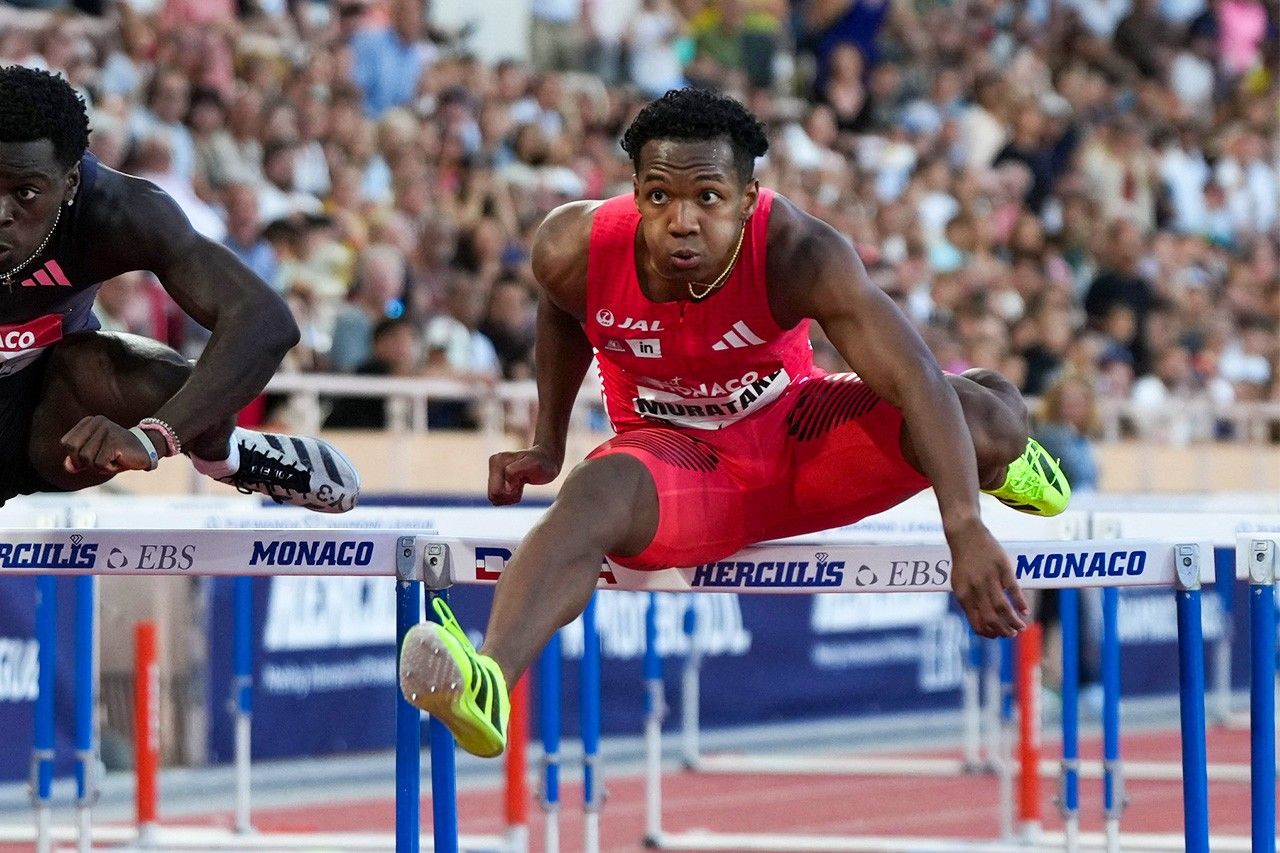
Born February 6, 2002. From Chiba Prefecture. Major achievements: National record (12.92), Athlete Night Games in Fukui, 2025 (second best for 2025 season); 5th place, Paris Olympics, 2024. (© Reuters)
(Originally published in Japanese. Banner photo: From left, Kitaguchi Haruka [© Getty/Kyōdō], Kawano Masatora [© Kyōdō], Tanaka Nozomi [© AFP/Jiji], and Kiryū Yoshihide [© Jiji].)

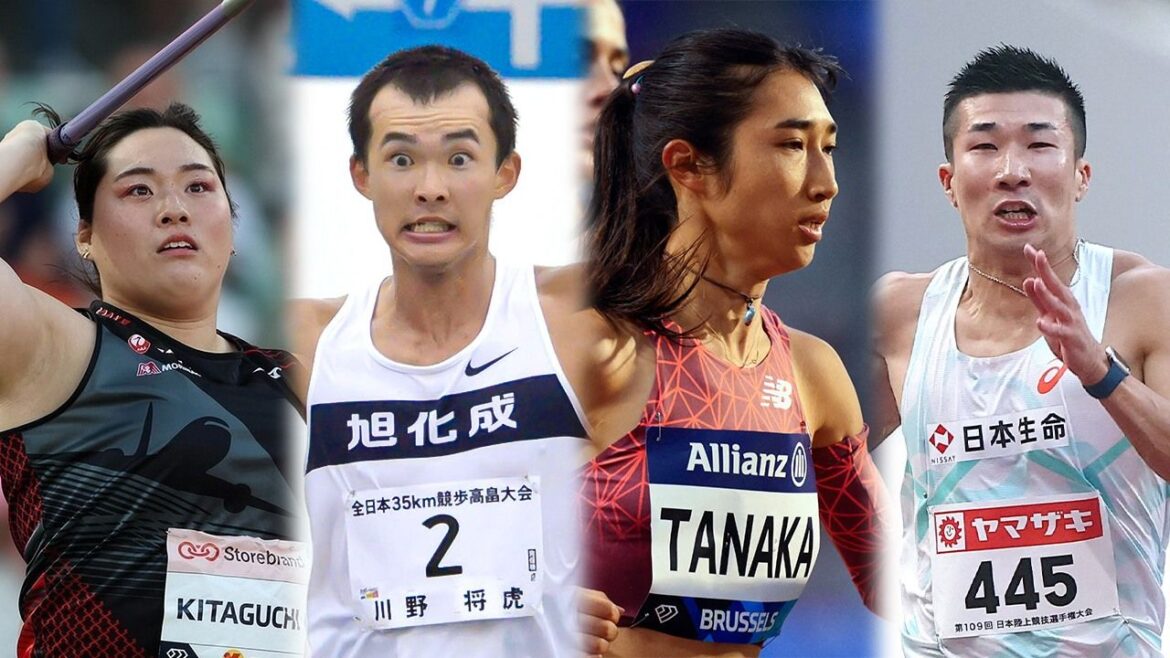
AloJapan.com